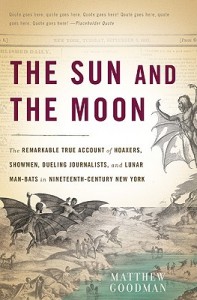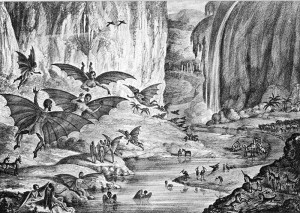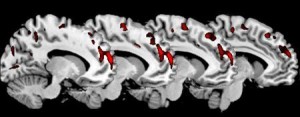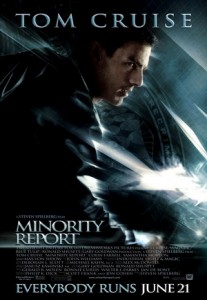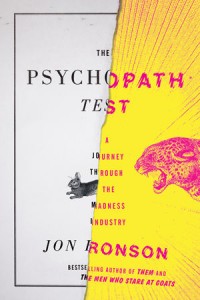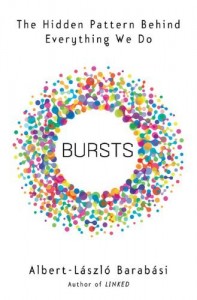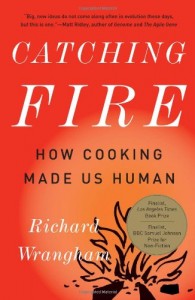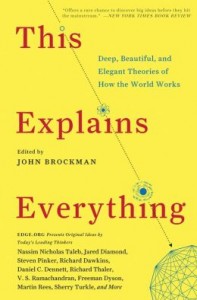 Edge is a collection of people, leaders in fields from physics to biology and successful business people and musicians. People we’ve all heard of, like Alan Alda, Jared Diamond, Steven Pinker, and Richard Dawkins, along with a lot of other people that aren’t yet household names, but are leaders in their respective fields. The goal of Edge is to simply get people — intellectual leaders of all sorts — and have them talk. Have them ask questions to one another, have them discuss important topics and push the frontiers of what we, collectively, know. As they summarize their purpose:
Edge is a collection of people, leaders in fields from physics to biology and successful business people and musicians. People we’ve all heard of, like Alan Alda, Jared Diamond, Steven Pinker, and Richard Dawkins, along with a lot of other people that aren’t yet household names, but are leaders in their respective fields. The goal of Edge is to simply get people — intellectual leaders of all sorts — and have them talk. Have them ask questions to one another, have them discuss important topics and push the frontiers of what we, collectively, know. As they summarize their purpose:
To arrive at the edge of the world’s knowledge, seek out the most complex and sophisticated minds, put them in a room together, and have them ask each other the questions they are asking themselves.
As part of this goal to ask and answer questions, each year the Edge contributors propose and vote on a question that they then each try to answer. This has been going on for a few years now and each year the answers are collected into a book, edited each year by John Brockman. The latest book, which is also the first one I read, is called This Explains Everything and collects the answers to the question: What is your favorite deep, elegant, or beautiful explanation?
The book collects about 150 answers from a large variety of people. Each answer is 1-10 pages and vary from choosing Darwin’s Theory of Natural Selection, to Maxwell’s Equations (what I personally would have chosen if I were part of this), to more modern cutting edge science that, to be honest, is sometimes a bit hard to follow. And it isn’t all science, there are poets and musicians who also contribute their answers.
For me, the best thing about this book isn’t necessarily knowing what Jared Diamond’s favorite explanation is, but rather to get different views on well established science, such as Darwin, as well as become exposed to new ideas that, as a scientist working in a very narrow field, I don’t come across in my daily work. Some of the ideas are simply weird — Aubrey De Grey suggests that it won’t be long until monogamy is a thing of the past, essentially equating sharing sexual partners to sharing chess partners. I’m not sure I buy that one. But, there are a lot of other great ideas which I was very happy to learn about. A couple of my favorites:
- Scott Atran: “reason itself is primarily aimed at social victory and political persuasion rather than philosophical or scientific truth”
- Joel Gold: “Aristotle defined man as a rational animal. Contradictions like these [described earlier] show that we are not.”
- Paul Steinhardt, in describing the discovery of quasi-crystals: “While elegance and simplicity are often useful criteria for judging theories, they can sometimes mislead us into thinking we are right when we are actually infinitely wrong.”
- Frank Wilczek: “In theoretical physics, we try to summarize the results of a vast number of observations and experiments in terms of a few powerful laws. We strive, in other words, to produce the shortest possible program that outputs the world. In that precise sense, theoretical physics is a quest for simplicity.”
- Gerd Gigerenzer: “Illusions are a necessary consequence of intelligence. Cognition requires going beyond the information given, to make bets and therefore to risk errors.”
- Anton Zeilinger: “without occasionally taking a risk, even in the most exact science no real innovation can be introduced.”
- Andre Linde: “mathematicians and physicists can live only in those universes that are comprehensible and where the laws of mathematics are efficient.”
- Gino Segre: “I have spent a good part of my career searching for an explanation of the masses of the so-called elementary particles. But perhaps the reason it has eluded us is a proposal that is increasingly gaining credence — namely, that our visible universe is only a random example of an essentially infinite number of universes, all of which contain quarks and leptons with masses taking different values.”
- Andrian Kreye: “In Europe, the present is perceived as the endpoint of history. In America, the present is perceived as the beginning of the future.”
- Helena Cronin: “And thus environments, far from being separate from biology, autonomous and independent, are themselves in part fashioned by biology.”
- John Tooby: “Natural selection is the only known counterweight to the tendency of physical systems to lose rather than grow functional organization — the only natural process that pushes populations of organisms uphill (sometimes) into higher degrees of functional order.” and “Entropy makes things fall, but life ingeniously rigs the game so that when they do, they often fall into place.”
- Peter Atkins: “We, too, are local abatements of chaos driven into being by the generation of disorder elsewhere.”
- Elizabeth Dunn, on why we feel pressed for time: “They argue that as time becomes worth more and more money, time is seen as scarcer.”
- Seth Lloyd: “The true symmetry of space is not rotation by 360 degrees but by 720 degrees.”
- Tim O’Reilly: “Climate change really is a modern version of Pascal’s wager. On one side, the worst outcome is that we’ve built a more robust economy. On the other, the worst outcome really is Hell. In short, we do better if we believe in climate change and act on that belief, even if we turn out to be wrong.”
- Alvy Ray Smith, on Pixar’s development of animation: “Motion blur was the crucial breakthrough. In effect, motion blur shows your brain the path a movement is taking and also its magnitude.”
- Albert-Laszlo Barabasi: “North America and Western European cuisine show a strong tendency to combine ingredients that share chemicals… East Asian cuisine thrives by avoiding ingredients that share flavor chemicals.”
- Lawrence Krauss, on the unification of electricity and magnetism and Maxwell’s equations: “It represents to me all that is best about science: It combined surprising empirical discoveries with a convoluted path to a remarkably simple and elegant mathematical framework, which explained far more than was ever bargained for and in the process produced the technology that powers modern civilization.”
- Robert Kurzban: “The idea is that when people intervene in systems with a lot of moving parts — especially ecologies and economies — the intervention, because of the complex interrelationships among the system’s parts, will have effects beyond those intended, including many that were unforeseen or unforeseeable.”
- Samuel Barondes: “personality differences are greatly influenced by chance events.”
- Stanislas Dehaene: “Our brain makes decisions by accumulating the available statistical evidence and committing to a decision whenever the total exceeds a threshold.”
- Andy Clark: “Language thus behaves a bit like an organism adapting to an environmental niche. We are that niche.”
- Nicholas Carr: “The shape of existence is the shape of failure.”
(Ok, my list is a little long… but it serves to illustrate some of the very interesting ideas and concepts that were discussed in this book.)
As I mentioned, the best thing about this book was just being exposed to ideas beyond what I encounter in my daily work. Not all of them are things I can personally use in my work, but they show some of the cutting edge work being done in other fields.
I greatly enjoyed the book and have already downloaded my next one from this group, This Will Change Everything.
